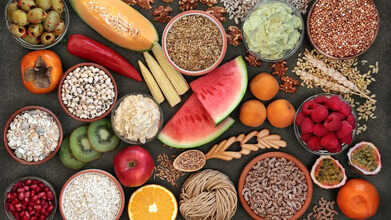- Health Conditions A-Z
- Health & Wellness
- Nutrition
- Fitness
- Health News
- Ayurveda
- Videos
- Medicine A-Z
- Parenting
- Web Stories
How Eating Blueberries Helps People Manage Kidney Disease

How Eating Blueberries Helps People Manage Kidney Disease
Kidney disease affects millions worldwide and requires a specific diet to manage the condition properly. Although dietary changes cannot undo kidney damage, they can reduce further damage and support kidney function. Among the recommended dietary choices for patients with kidney disease, blueberries are one of the most nutrient-dense, kidney-friendly superfoods.
My aunt has been suffering from recurring kidney stones. She experiences sharp pain, nausea, and visits the doctor regularly. She now lives with dietary restrictions and medication in her daily life, disrupting her routine. However, she remains optimistic and looks for ways to prevent such situations in the future, such as increasing water intake and dietary changes to improve her health condition.
Kidneys play a significant role in filtering waste, maintaining the chemical balance of body fluids, and producing hormones that regulate blood pressure. When function is impaired, waste products build up in the blood, and diet changes to limit harmful nutrients are required. A renal diet is specifically tailored to the stage of kidney disease and focuses on lowering potassium, sodium, and phosphorus intake to prevent further workload for the kidneys.
Since kidney disease often coincides with other chronic conditions like diabetes and heart disease, a diet low in saturated fats and rich in plant-based foods is critical. Combining a kidney-friendly and heart-healthy diet can significantly enhance overall well-being.
Why Blueberries are Good for your Kidney Health?
Blueberries are highly dense with nutrients, which is why they are very popular for numerous health conditions, including kidney disease. Here's why they're a superfood:
Low Potassium Content
A ½ cup serving of blueberries has less than 150 milligrams of potassium, making them ideal for a kidney-friendly diet.
Rich in Antioxidants
Rich in anthocyanins, which neutralize oxidative stress and inflammation-two precursors to chronic kidney disease, blueberries contain
Low Sodium and Phosphorus
The former minerals, when over-ingested, can worsen the problems of the kidneys, which the blueberries have lower contents.
Nutrient-Dense
Loaded with vitamin C, vitamin K, and fiber, these nutrient-dense berries can contribute to immune function and good digestive health, being low-calorie.
Furthermore, the benefits that blueberries have in the protective function of blood vessels and glucose metabolism may help lower the chances of complications of kidney disease like heart disease and diabetes.
Blueberries and Diabetes Care
Diabetes is the number one cause of kidney disease, and the maintenance of blood sugar levels helps preserve the kidneys. Blueberries can be a sweet and low glycemic treat to indulge on without spiking the sugar level in the blood.
For those who have both diabetes and kidney disease, blueberries can be incorporated into a meal plan alongside other recommended foods, such as lean proteins, low-potassium vegetables, and whole grains. A switch from potassium-rich fruit juices such as orange juice to a blueberry-based smoothie or snack can also help protect the kidneys.
How to Add Blueberries To a Kidney-Friendly Diet
With its versatility, blueberries can easily be fit into almost any meal or snack. Here are some ideas:
1. Add a handful of fresh or frozen blueberries to oatmeal, yogurt, or smoothies for a nutrient-packed start to your day.
2. Enjoy blueberries as a stand-alone snack or with a handful of unsalted nuts.
3. Top leafy green salads with fresh blueberries for a pop of flavor and color.
4. Make an easy dessert using blueberries, whipped cream, and a drizzle of honey.
High-Protein Peanut Butter, Banana & Blueberry Overnight Oats Recipe
Great Option For the More Creative is an example of the High-Protein Peanut Butter, Banana & Blueberry Overnight Oats, whose base is the combination with Greek yogurt, plus other kidney-friendly ingredients - without forgetting unsweetened soymilk, for satisfaction with healthy nutrition that fuels all those parts needed during the day.
Ingredients:
- 2 large firm-ripe bananas, smashed
- 1 large plain nonfat strained yogurt
- ½ unsweetened soymilk
- ¼ cup natural peanut butter
- 1 tablespoon pure maple syrup
- Pinch of salt
- 1 cup old-fashioned rolled oats
- 1 cup blueberries (plus more for garnish)
Instructions:
- Mash one banana in a bowl. Add yogurt, soymilk, peanut butter, maple syrup, and salt; mix well.
- Mix in oats and blueberries. Cover and refrigerate for at least 8 hours.
- Before serving, slice the second banana and top the oats with the slices. Garnish with extra blueberries.
This dish can be kept in the refrigerator for up to three days and makes a perfect grab-and-go meal.
Adding blueberries into your diet offers numerous benefits for kidney health. Their low potassium, sodium, and phosphorus content makes them ideal for individuals with kidney disease, while their rich antioxidant profile supports overall health. Moreover, their natural sweetness and versatility make them a delightful addition to meals and snacks.
Is The Viral Wellness Trend ‘Fibremaxxing’ Helping Or Harming Your Gut?

Credits: CANVA
Tiktok fibremaxxing wellness trend: There is no shortage of wellness trends online that claim to transform your health, but a new one has taken over social media with a focus on gut health. It’s called “fibremaxxing,” and its premise is simple: eat more fibre to improve digestion, metabolism, immunity, and lower the risk of disease. On TikTok and Instagram, the trend often appears as colourful lentil bowls, chia puddings, and smoothies loaded with leafy greens and flaxseeds. But how much of this viral trend is actually backed by science?
The idea of increasing both soluble and insoluble fibre isn’t new, yet fibremaxxing has made it trendy again—and this time, for good reason. Fibre is vital to everyday health, supporting everything from steady blood sugar to regular bowel movements. Here’s what experts say about this growing movement and why fibre truly matters.
What Is Fibremaxxing?
Fibremaxxing is a social media movement that encourages people to boost their fibre intake by adding more fruits, vegetables, legumes, and whole grains to every meal. The goal is to improve digestion, promote fullness, and support long-term health. According to Dr. Urvi Shah, a board-certified hematologist-oncologist and physician at Memorial Sloan Kettering Cancer Center, the concept behind fibremaxxing is largely rooted in scientific evidence. Dr. Shah, who is leading multiple studies on high-fibre plant-based diets, notes that the approach aligns well with established nutrition research.
Is ‘Fibremaxxing’ Good Or Bad For Your Gut?
High-fibre diets are consistently linked to a wide range of health benefits, from lowering the risk of heart disease, diabetes, and colon cancer to aiding weight control and gut function. That’s why Dr. Shah believes fibremaxxing gets several aspects right.
She explains that including a wide variety of plant-based, high-fibre foods is essential because “different fibre types feed different microbes.” A diverse diet helps nurture a balanced microbiome. She adds that the trend’s emphasis on whole foods rather than processed or fibre-enriched items is a major plus. “Whole plants provide fibre, polyphenols, and micronutrients that work together to support the gut,” she says. Prebiotic-rich foods also help shape a healthier microbiota and increase the production of beneficial short-chain fatty acids like butyrate, which has “anti-inflammatory and anti-cancer effects.”
Simply put, upping your fibre intake through natural, unprocessed foods, rather than supplements, can make a real difference to gut health.
What’s The Daily Recommended Amount of Fibre Intake?
Experts suggest that adults should consume between 25 and 30 grams of fibre each day. Men typically require more (around 38 grams), while women need about 25 grams. These numbers can vary depending on age, sex, and calorie intake, but a general guideline is 14 grams of fibre for every 1,000 calories eaten, according to Harvard Health.
How To Add Fibre To Your Diet?
Plant-based foods are the easiest way to increase your fibre intake, this could mean starting your morning with oats or simply adding more vegetables to your meals. Dietitian Laura Tilt notes that several everyday foods are surprisingly high in fibre:
- Rolled porridge oats – 4.5g per 50g (half cup)
- Canned chickpeas – 7g per half can
- Seeded bread – 5g per two slices
- Canned lentils – 6g per half can
- Frozen peas – 4.5g per 80g (3 tbsp)
- Frozen raspberries – 5.5g per 80g (3 tbsp)
- Wholemeal pasta – 6.5g per 75g serving
- Dried apricots – 3g per 3–4 pieces
- Reduced salt/sugar baked beans – 7.5g per half can
- Mixed milled seeds (flax, pumpkin, chia) – 4.5g per 25g
Is Fibremaxxing Helpful?
There’s no doubt fibre plays an essential role in maintaining good health. But like any nutrient, too much of it can cause problems if not balanced properly. A sudden surge in fibre intake without enough water can lead to bloating, gas, constipation, dehydration, or even trigger IBS symptoms. Over-focusing on fibre might also cause you to overlook other nutrients your body needs. The key is moderation, fibre is beneficial, but it works best as part of a balanced, varied diet.
Why Cant I Digest Milk, But Can Easily Eat Yogurt?

Credits: Canva
If you landed here, the reason is that you are also someone who cannot tolerate milk, but loves yogurt, and are probably wondering why is that?
The logic is that if you have lactose intolerance, you won't be able to digest any dairy product, but with yogurt, your life is easy. The answer lies in the components of the two various dairy products that come from the same source.
Why Can't You Digest Milk?
The reason is because you are lactose intolerant. This is a condition that makes it hard to digest the sugar in milk and milk products, called lactose. People with lactose intolerance could have diarrhea, gas and bloating after they consume milk. While this condition is usually harmless, it can cause discomfort.
This happens because the enzymes in the small intestine, called lactase is responsible for lactose intolerance. If someone has too low levels of lactase, the person can become lactose intolerant.
The small intestine and colon are parts of the digestive tract, which processes the foods you eat. The intestine pull out nutrients from the food and whatever is not absorbed by the intestines continues along the digestive tract and is expelled as stool during a bowel movement.
But Why Can You Digest Yogurt, If You Cannot Digest Milk?
The answer to this lies in the fermentation process that turns milk into curd and breaks down much of the lactose, which is the sugar, that is often difficult to digest. The probiotic bacteria used to make curd contain their own lactase, which helps in the breakdown of lactose, and this can further help with digestion even for those who do not produce enough lactase on their own.
Furthermore, during fermentation, the bacteria in curd, called the Lactobacillus bulgaricus and Streptococcus thermophilus convert lactose into lactic acid, which is easier for the body to process. This helps your body to digest curd easily over milk. Since the bacteria contains lactase, which the milk lacks, some people may find it easier to digest curd or yogurt over milk.
The bacterial cells also physically protect their lactase, and it can work to break down the lactose from the curd as it passes through the digestive system.
Why Is Curd Gut-Friendly?
The key to a healthy gut health is lactobacillus, a kind of probiotic, which helps in digestion, suppression of disease-causing bacteria and treats constipation. It also is beneficial in treating irritable bowel syndrome. It breaks down sugar into lactic acid.
A study by a Bhubaneswar-based professor Balamurugan Ramdas also revealed that Bengal or Odisha's popular breakfast Panta Bhaat, which includes fermented cooked rice, also releases the same bacteria, that fermented milk releases and so it contains short-chain fatty acids, which are responsible for improving gut health and boosting immunity.
Furthermore, curd is known to balance the gut flora, probiotics improve digestion, and the absorption of nutrition. They also help in the breakdown of food, reducing issues like bloating, gas, and constipation. The probiotics in curd can help restore the natural balance in your gut, which can soothe an upset stomach and alleviate discomfort from indigestion. A healthy gut is closely linked to a strong immune system, and the probiotics in curd help to boost gut health, which in turn can enhance immunity.
Sourdough vs Regular Bread: Which One Is Actually Better For Your Gut?

Credits: Canva
Bread is a staple across most diets, but not all loaves are made the same. In recent years, sourdough has gained a reputation for being the “healthier” bread—praised for its tangy flavour, natural fermentation, and supposed benefits for digestion. But how much of this is true? Here’s what experts and studies reveal about how sourdough compares to regular bread in terms of health and nutrition.
What Makes Sourdough Different
Unlike most commercial breads that rely on baker’s yeast for quick rising, sourdough is made using a natural starter—a mixture of flour and water that ferments over several days. This starter contains wild yeast and lactic acid bacteria, which break down carbohydrates and gluten during fermentation.
According to the Harvard T.H. Chan School of Public Health, this slow fermentation process increases the bioavailability of nutrients like folate and magnesium while producing organic acids that give sourdough its characteristic tang. In contrast, regular white or whole wheat bread undergoes a much faster process, often with added yeast, sugar, and preservatives to speed up production.
Easier on Digestion
One of sourdough’s biggest advantages lies in how it affects the gut. The fermentation process partially breaks down gluten, making it easier for some people to digest compared to conventional bread.
A 2021 review published in the journal Food Microbiology found that lactic acid bacteria in sourdough can help reduce compounds called FODMAPs—a group of carbohydrates known to trigger bloating and discomfort in people with irritable bowel syndrome (IBS). This makes sourdough a potentially gentler option for sensitive stomachs, though it’s not suitable for those with celiac disease.
Better Blood Sugar Control
Another reason nutritionists often recommend sourdough is its effect on blood sugar levels. The acids produced during fermentation slow down the rate at which glucose is released into the bloodstream.
Research published in the Journal of Cereal Science noted that sourdough bread has a lower glycemic index (GI) than regular white or whole wheat bread. This means it causes a slower, more stable rise in blood sugar, something especially beneficial for people with diabetes or insulin resistance.
Nutrient Profile and Shelf Life
While both sourdough and regular bread contain similar calories and macronutrients, sourdough tends to have slightly higher levels of antioxidants and minerals because of the fermentation process. It also naturally resists mould growth, allowing it to stay fresh longer without artificial preservatives.
As per Cleveland Clinic dietitians, choosing whole-grain sourdough offers the best nutritional value, combining the fibre of whole wheat with the gut-friendly benefits of fermentation. On the other hand, refined white breads offer little fibre and are often fortified artificially.
The Bottom Line
Sourdough is not a miracle food, but it does stand out as a healthier and more digestible alternative to most commercial breads. Its fermentation process not only enhances flavour and texture but also supports gut health and stable blood sugar levels.
If you enjoy bread and want to make a more wholesome choice, opt for an artisanal or homemade sourdough made with whole grains and minimal additives. As nutrition experts often say, the real key is balance, pair your bread with fibre, protein, and healthy fats for a meal your gut (and taste buds) will thank you for.
© 2024 Bennett, Coleman & Company Limited

